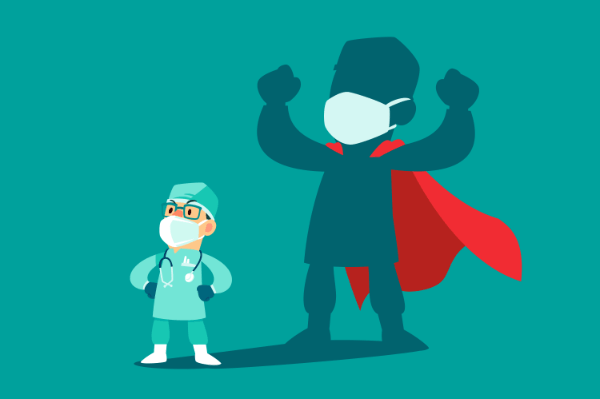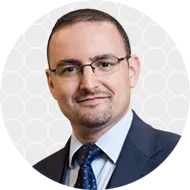
This is an exclusive interview of Mr Adil Ajuied, a Consultant Orthopaedic Surgeon, which outlines his very unique journey from a leading and recommended orthopaedic consultant to a ventilator-trained doctor working at the Covid-19 Nightingale hospital.
1. Mr Ajuied, please tell us a bit about yourself and your usual practice?
I am a consultant orthopaedic surgeon specialising exclusively in treating all knee conditions, in particular sports injuries.
I had a blue-collar upbringing in East London and went on to study medicine at Guys & St Thomas’ before training in orthopaedics in the south-east. After successfully completing further extensive postgraduate training I went on to complete a number of fellowships including a fellowship in South Africa with which I have very strong links.
Upon returning to the UK from fellowship I was fortunate enough to be appointed as a consultant at Guys & St Thomas’ where I have been a consultant for over 10 years. I often say to colleagues that I feel like Harry Potter returning to Hogwarts to teach!
2. You are a well established and recommended orthopaedic surgeon, what made you choose this specialty?
Like many of us upon graduating, I wasn’t very sure as to what specialty I would pursue, however my very first house job was in orthopaedics, and I knew almost immediately that this was what I wanted to pursue.
I love the variety of patients that we have the privilege of caring for, ranging from paediatrics to geriatrics, as well as couch potatoes to professional athletes.
3. How have things changed in your own specialty and practice as a result of COVID-19?
COVID-19 and the resultant response both at a societal and professional level have been both unprecedented and unimaginable.
As for all of the profession, I have seen all elective activity suspended, a significant move towards tele-medicine for continuity of care and a significant reduction in new patient contact while everyone is locked down.
We’ve also seen significant resource reallocation and infrastructure changes both within our NHS setting and within the private sector. This has included having elective wards and clinical areas repurposed for the care of Covid patients and the significant expansion of ITU ventilated bed capacity within the NHS. At Guys & St Thomas’ during usual times we would generally have 90 ventilated beds across the trust; this has been ramped up to a surge capacity of a maximum of 370 beds, which thankfully has not been required. I think this gives us an illustration of the substantial reconfiguration that has been necessary.
4. You made the bold decision to retrain in ITU care to support the herculean efforts of frontline staff at the Nightingale hospital – what made you decide to do this?
In the first week or two of the lockdown I was redeployed to frontline emergency orthopaedic care and returned to the on-call rota at St Thomas’. It was of course very rewarding to be working closely with my colleagues and supporting our A&E department in emergency care.
When the call went out asking for people to put themselves forward for the Nightingale hospital my hand went up. Firstly I felt that my NHS department was really very well staffed and I had excellent colleagues delivering an excellent service. I also felt that I wanted to do my bit wherever possible to contribute to the amazing efforts that NHS professionals, and the NHS as a whole, was making in responding to the crisis.
5. What was it like and what can you share about how it felt to be there?
Initially, I underwent an induction and training program to bring me up to speed before I was deployed on the floor of a Nightingale ITU.
Essentially my role was that of a ward doctor, which essentially equated to being an ITU SHO. The environment was rather alien as everyone was fully covered in PPE and communicating in a combination of speech and sign language. All of this was being delivered in the centre of an exhibition hall in East London… bizarre! But as is so often the case, this all became so quickly normal.
I found that I was able to pick up the ropes quite quickly and benefited from working with some outstanding nursing and senior clinical colleagues. I felt that our broad and general approach to medical training here in the UK meant that I was able to turn my hand to a different specialty a lot easier than I had anticipated.
More latterly, I joined the Nightingale induction training faculty, where I helped to onboard other staff. Here I was helping to train ITU doctors and nurses, as well as other staff such as cabin crew and dentists, in subjects such as fluid management, airway care, and resuscitation.
6. Is there anything from this experience you can take back to your own specialty after Covid-19?
This experience has certainly strengthened my belief in the value of team working and multidisciplinary working. While this has always been part of my practice seeing everybody pull together at the Nightingale was quite inspiring.
7. Do you have any advice for other speciality who may be interested in exploring other branches of medicine outside of their own specialty?
My advice to anyone thinking of branching outside of their chosen specialty would be that it is important to be very clear as to your reason ‘why’? Once you are clear on this, I would strongly advise following your heart.
As sub-specialists we do question how useful we are as general physicians, as we progress through our career we tend to learn more and more about less and less.
I think we fail to recognise and under value the breadth and depth of all of the generality in our early training. It was this generality I found I was able to fall back upon in this time of crisis.
This article is for information only and should not be used for the diagnosis or treatment of medical conditions. myHealthSpecialist makes no representations as to the accuracy or completeness of any of the information in this article or found by following any link from this article. Please consult a doctor or other healthcare professional for medical advice.

Mr Adil Ajuied, Consultant Orthopaedic Surgeon